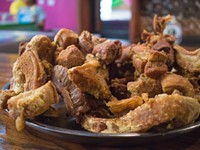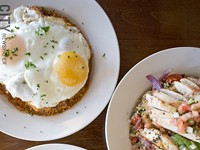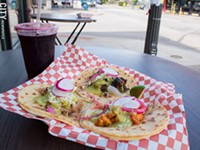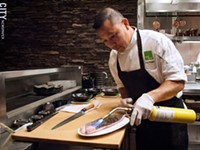[
{
"name": "500x250 Ad",
"insertPoint": "5",
"component": "15667920",
"parentWrapperClass": "",
"requiredCountToDisplay": "1"
}
]
There was a phrase heard again and again while interviewing those that knew Joe Palozzi, endearingly known as Java Joe: "That was just Java." Whether people were describing how he golfed barefoot — something he picked up when he lived in Hawaii — or how when he would deliver coffee to restaurants that he loved, he'd walk into the cooler, grab whatever he wanted cooked for him, be it lobster, steak, you name it, and still charge you for the coffee.
He had a passion for coffee; Palozzi opened his first coffee shop in the 1970's, spent time in Hawaii as a coffee farmer in the 1980's, and opened Java's on Gibbs in 1992. He spent a lot of his time at Java's at the Market, doing what he loved best: roasting. When people talk about third wave coffee, about wanting a high quality product as well as knowing where the coffee comes from and fair trade, Java Joe was talking about all this decades ago. Palozzi was a connoisseur of not just coffee, but of food, wine, and life.
Palozzi ended a year-long battle with cancer on Saturday, March 11. He was 68. CITY spoke with a few of those that knew Java Joe to get a small glimpse of who he was and how he influenced Rochester. If you knew Palozzi, add your own memories of to the comments below this article.
Mike Calabrese, co-owner of Good Luck, took over Java's on Gibbs in 1997. He ran the retail end, and Palozzi continued to roast the coffee. At Java's at the Market, you could find Palozzi roasting or hanging out with local customers and restaurateurs. "He used to say, 'I know two things: I know coffee, and I know people,'" Calabrese says. "He had a real good sense of reading people."
Palozzi would take Calabrese with him on trips to explore coffee plantations in Guatemala, Puerto Rico, and other coffee-producing countries. "His life was so rich in adventures; in trying things and doing things," Calabrese says. "Those memories of being on coffee plantations are so beautiful and personal to me; I will never forget."
A common thread that runs through the conversations about Java Joe is that he lived life like every day was the last. "He showed me what a true free spirit was," Calabrese says, "not to worry about things and really just go for it. He never worried about if something was going to be super successful; he wanted to do something and try it. He went for it. Everything was successful because he tried it."
Chuck Cerankosky worked at Java's on Gibbs Street from 1999 to 2012. He currently co-owns Good Luck, is the owner of Cure, and will soon open Radio Social. Cerankosky remembers Palozzi as being at the forefront of the current trends in not just coffee culture, but also in dining and cocktail cultures.
"Back in the 90's," Cerankosky says, "Joe had these sweatshirts made that said, 'Java Joe's Coffee Experience,' and at the time I'm 18 years old and am like, 'Coffee experience? What is that? It's coffee, dude. Coffee is coffee.' But what Java knew back then, when he started roasting in the 1970's, he knew that coffee had this transcendental quality when you appreciate it as an ingredient instead of as a commodity.
"And now you look around you, and there are all of these third wave coffee shops, where they're talking about tasting notes, etc. Java Joe taught us how to eat and drink, and not only about coffee. He taught me that there is so much deliciousness in the world; there's so much food in life. And there was so much life in him."
Tony Colon, owner of Fuego Coffee Roasters, started working in 2006 at Java's on Gibbs as a barista. He didn't have much interaction with Palozzi until he started managing Java's and doing deliveries at the market. That's when they started talking about roasting, and Colon would watch him do it. Colon developed a passion for it, and he and his wife would go on to open Fuego Coffee Roasters. "We had the same idea about coffee," Colon says, "and how we wanted to source coffee; work specifically with farmers. Really looking for high quality coffee and have it be traceable."
In terms of Palozzi's influence on the coffee scene in Rochester, Colon believes that he had an influence on anyone that has been a roaster here. "I think it's important for people to know that if we did not have the roots that we had, there would be no Fuego. There would be no Fuego Coffee Roasters without Java Joe."
There is a photo of Palozzi that has hung for years on the wall next to the espresso machine at Osteria Rocco. "I know there were all these new, hip, coffee things going on, but I always stuck with Joe," says Rocco owner Mark Cupolo. Cupolo was working at Max at Eastman Place when he met Palozzi and would go hang out at Java's at the Market.
"It was a good place to sit around and hang," he says. "You could sit over there, kill time in his shop, and you didn't have to say much; just enjoy the peace and quiet."
Cupolo says he found it a compliment when Palozzi would order Rocco's linguini with clams — Java Joe was particular about the food and restaurants that he liked. "They talk about his free spirit," Cupolo says. "It seemed like he was always in control of his own work, and I always liked that."
Tony Gullace, owner of Max Rochester, describes Java Joe as "the ultimate foodie." When Gullace ran the Water Street Grill, Palozzi would come in every Wednesday to make gnocchi with him. Palozzi would then walk around the dining room, peddling the gnocchi special to unsuspecting diners. "He would say, 'Have you had the gnocchi? They're so light you need a butterfly net to catch them," Gullace recalls.
Gullace and Palozzi stayed close when Gullace left Water Street Grill to open Max. "He had such a passion for coffee," Gaullace says. "It was all about the bean and the roasting, and he had all the answers. He had a wanderlust for life; I was jealous that anyone could be that carefree."
Speaking of...
-

CHOW HOUND: What's happening on Rochester's dining scene
Jul 29, 2022 -

Cuomo loosens capacity restrictions on restaurants
Mar 8, 2021 -

International food round-up
Aug 28, 2019 - More »
Latest in Restaurant News
More by Katie Libby
-

Chow Hound: Blades
Sep 14, 2018 -

Chow Hound: Neno's food truck gets brick-and-mortar
Aug 31, 2018 -

Chow Hound: Omakase at Next Door Bar & Grill
Aug 20, 2018 - More »



